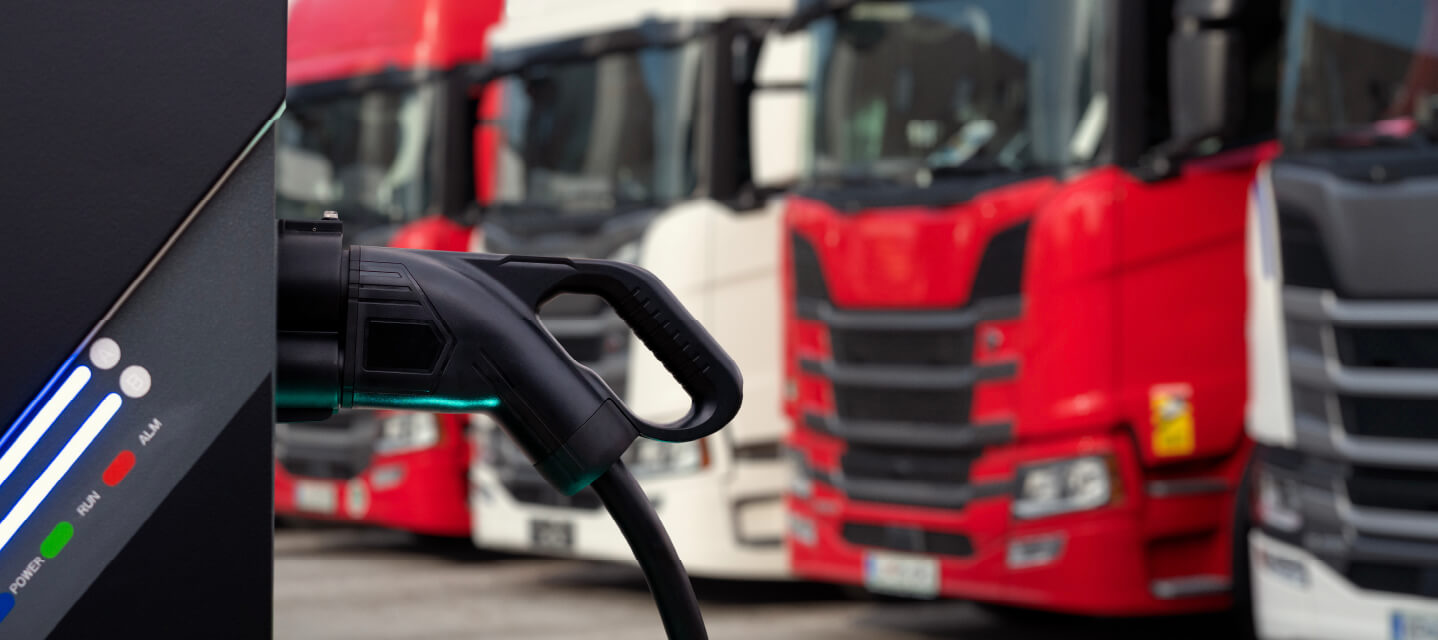Replacing gas cars with electric could save more than 40 tons of CO2 emissions per car
Replacing gas cars with electric vehicles can result in a dramatic reduction of CO2 emissions.

Decarbonisation — the reduction of carbon — is an important part of the fight against climate change. The transportation sector in particular, since it is a large source of greenhouse gas emissions, is one area where cutting carbon can make an impact. In the U.S., the transportation sector produces 29% of total greenhouse gas emissions, and in the EU, that figure is 27%. An effective long-term strategy for curbing CO2 emissions is to switch from gasoline-powered vehicles to electric vehicles (EVs).
Major cities have taken serious steps to facilitate the EV transition. Last December, for example, Madrid hosted the Climate Action Summit, in which companies and governments committed to electrifying their fleets by 2030.
Nevertheless, there are still certain obstacles to carrying out this change. According to PONS and LUIKE’s study VIII Estudio sobre seguridad de las flotas conectadas y las flotas compartidas, the main obstacles towards fleet electrification are price, battery range and charging infrastructures.
Geotab studies how many fleet vehicles are candidates for EV replacement
Geotab carried out a global study on the likelihood of fleets going electric today, based on 18 months of connected vehicle data.
The main goal of this study was to look for the best electric vehicle alternative to each internal combustion vehicle considering that the vehicles drive a shorter distance than what the battery range allows them to in the worst conditions.
In a period of time of 18 months we calculated how many kilometers each vehicle drives daily, compared the figure to the specs of current available EV models worldwide, and then made recommendations for electric vehicles that could perform their necessary daily routes on a single charge, charging overnight.
The results
We found out that in these conditions, almost 8% of the vehicles in the study could be substituted today by electric vehicles, resulting in significant cost savings. This percentage could increase up to 21% if these vehicles could be charged during the day for the 5% of the days with the longest travel.

The economic and environmental impact of electrification was also analyzed. If these vehicles had a lifespan of 200,000 km or 7 years, as compared to an internal combustion vehicle, in the majority of cases, switching to an electric vehicle would lead to savings between 9000 and 18000 Euros per vehicle.
Moreover, if we take into consideration that burning one liter of gasoline produces approximately 2.3 kg of CO2, if the study were put into practice in Spain, there would be a reduction of 41 tons of CO2 per substituted vehicle.
Canada and the U.S. would reduce more than 50 tons of CO2 per vehicle if they went for the electric alternative. According to this study, the average CO2 savings worldwide would be over 40 tons per vehicle. Chicago and New York would be among the cities that would obtain the most benefits, while vehicles in Madrid and Barcelona would reduce around 40 tons per vehicle.
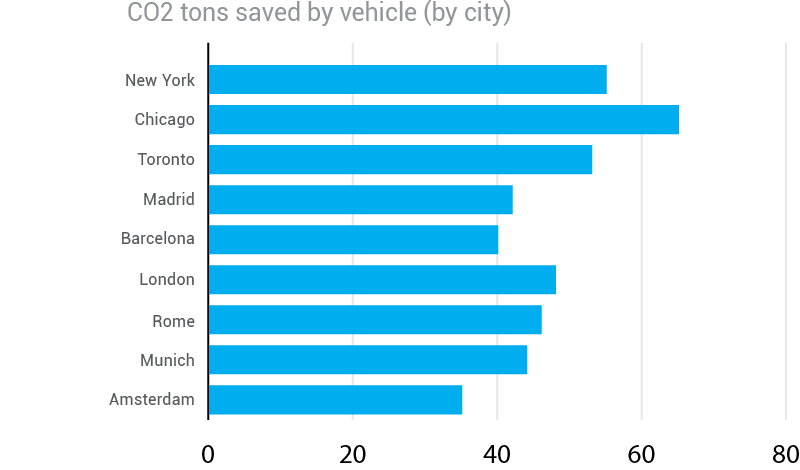
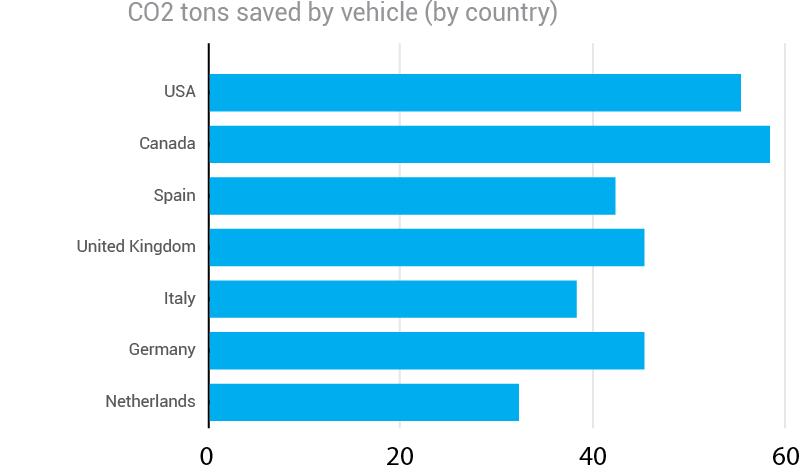
This study is a large-scale version of one of the latest solutions available for Geotab customers: the Electric Vehicle Suitability Assessment (EVSA). This tool helps companies make data-based decisions on which vehicles to substitute for electric vehicles.
The EVSA looks at telematics data collected by the existing fleets, and highlights opportunities for switching to electric vehicles when an electric vehicle can fulfil the daily driving range requirements as well as achieve lifetime cost savings compared to a fuel-powered vehicle.
Conclusion
In conclusion, this study carried out by Geotab shows that there is a large quantity of internal combustion vehicles which could be substituted by electric vehicles right now without having to worry about battery range. We expect that the optimal percentage change in this study will grow rapidly in the next few years as new models become available and due to government support and to the constant innovation and battery improvement in this flourishing sector.
Subscribe to the Geotab Blog
The Geotab Team write about company news.
Table of contents
Subscribe to the Geotab Blog
Related posts

Geotab’s new fleet Sustainability Center simplifies fuel and emissions reduction
June 13, 2025
3 minute read
.jpg)
Lead with Trust: How Geotab Helps Businesses Navigate CSRD Compliance
March 19, 2025
2 minute read
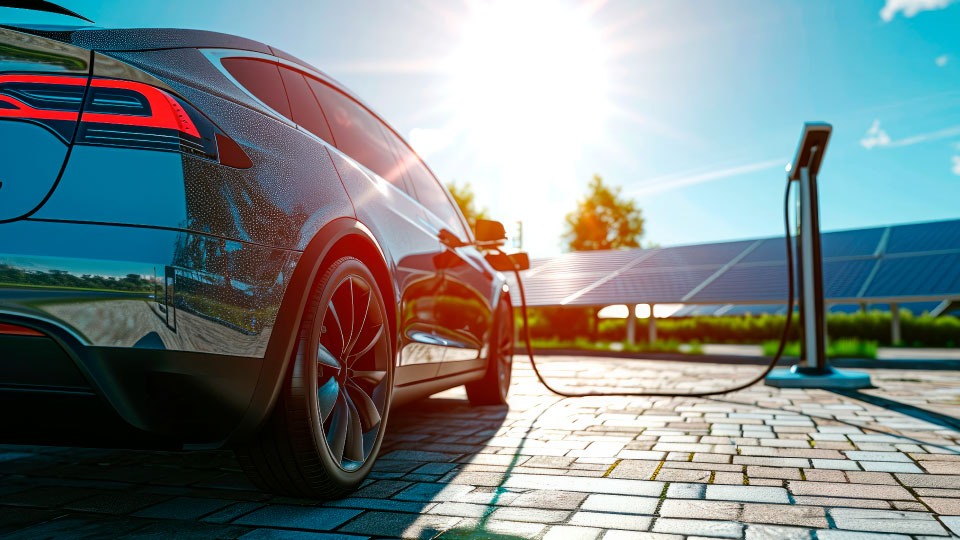
2030 or 2035, the UK Needs Meaningful Action on EVs Now
September 6, 2024
2 minute read
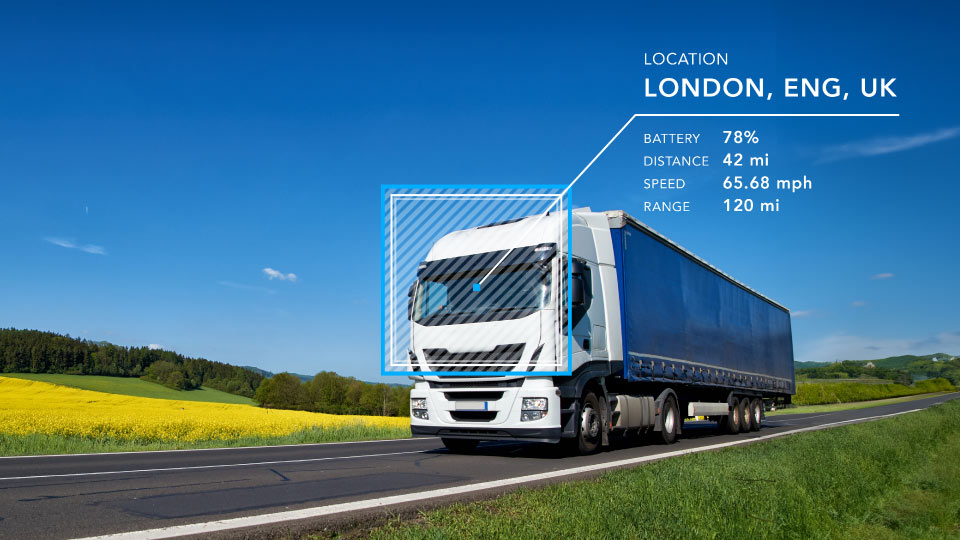
Driving smarter: Insights from Geotab’s “Taking Charge” Report
August 8, 2024
2 minute read

The art of the possible: Insights from Geotab’s “Taking Charge” Report
June 20, 2024
3 minute read

